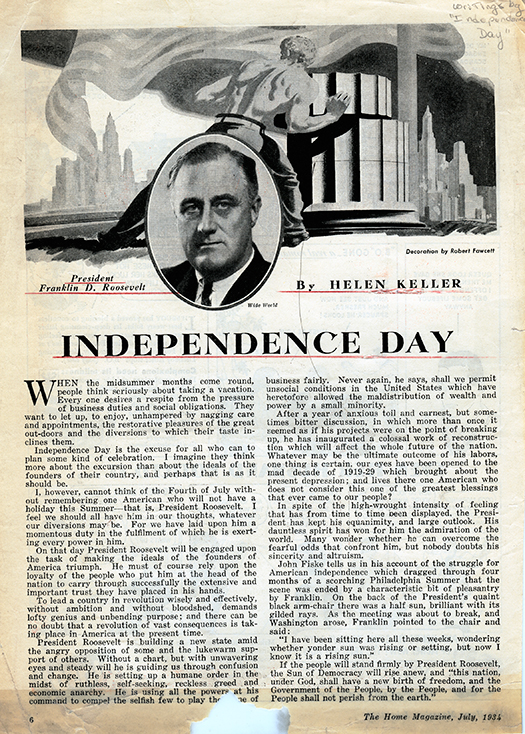Happy Fourth of July!
Helen Keller fought her entire life for social and economic equality for all. During the 1930s she used the platform of the popular Home Magazine to express her ideas and encourage self-reliance, education, and hope, particularly among women. On the occasion of the Fourth of July, 1934, she encouraged readers to reflect on democracy and the work of U.S. President Franklin D. Roosevelt who sought to lift the country out of its economic woes.
"Independence Day" by Helen Keller Home Magazine, July 1934

Transcript
When the midsummer months come round, people think seriously about taking a vacation. Every one desires a respite from the pressure of business duties and social obligations. They want to let up, to enjoy, unhampered by nagging care and appointments, the restorative pleasures of the great out-doors and the diversions to which their taste inclines them.
Independence Day is the excuse for all who can to plan some kind of celebration. I imagine they think more about the excursion than about the ideals of the founders of their country, and perhaps that is as it should be.
I, however, cannot think of the Fourth of July without remembering one American who will not have a holiday this Summer – that is, President Roosevelt. I feel we should all have him in our thoughts, whatever our diversions may be. For we have laid upon him a momentous duty in the fulfillment of which he is exerting every power in him.
On that day President Roosevelt will be engaged upon the task of making the ideals of the founders of America triumph. He must of course rely upon the loyalty of the people who put him at the head of the nation to carry through successfully the extensive and important trust they have placed in his hands.
To lead a country in revolution wisely and effectively, without ambition and without bloodshed, demands lofty genius and unbending purpose; and there can be no doubt that a revolution of vast consequences is taking place in America at the present time.
President Roosevelt is building a new state amid the angry opposition of some and the lukewarm support of others. Without a charge, but with unwavering eyes and steady will he is guiding us through confusion and change. He is setting up a humane order in the midst of ruthless, self-seeking, reckless greed and economic anxiety. He is using all the powers at his command to compel the selfish few to play the game of business fairly. Never again, he says, shall we permit unsocial conditions in the United States which have heretofore allowed the maldistribution of wealth and power by a small minority.
After a year of anxious toil and earnest, but sometimes bitter discussion, in which more than once it seemed as if his projects were on the point of breaking up, he has inaugurated a colossal work of reconstruction which will affect the whole future of the nation. Whatever may be the ultimate outcome of his labors, one thing is certain, our eyes have been opened to the made decade of 1919-1929 which brought about the present depression; and lives there one American who does not consider this one of the greatest blessings that ever came to our people?
In spite of the high-wrought intensity of feeling that has from time to time been displayed, the President has kept his equanimity, and large outlook. His dauntless spirit has won for him the admiration of the world. Many wonder whether he can overcome the fearful odds that confront him, but nobody doubts his sincerity and altruism.
John Fiske tells us in his account of the struggle for American independence which dragged through four months of a scorching Philadelphia summer that the scene was ended by a characteristic bit of pleasantry by Franklin. On the back of the President's quant black arm-chair there was a half sun, brilliant with its gilded rays. As the meeting was about to break, and Washington arose, Franklin pointed to the chair and said:
"I have been sitting here all these weeks, wondering whether yonder sun was rising or setting, but now I know it is a rising sun."
If the people will stand firmly by President Roosevelt, the Sun of Democracy will rise anew, and "this nation, under God, shall have a new birth of freedom, and the Government of the People, by the People, and for the People shall not perish from the earth."